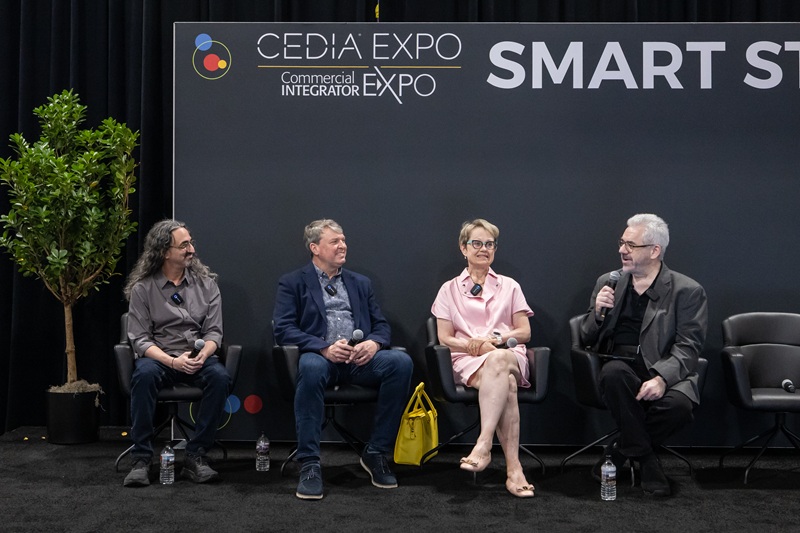A panel of seasoned industry analysts gathered at the IMCCA Smart Stage panel at CEDIA Expo/CIX 2025 to dissect the current state of the AV and collaboration industries. Moderated by David Danto, principal analyst at Talking Pointz, the discussion featured insights from David Maldow of Let’s Do Video, Kevin Kieller of enableUC and Nancy Knowlton of Nureva. The group explored a landscape marked by profound technological shifts, economic uncertainties and the ever-present influence of artificial intelligence.
The conversation provided a clear snapshot of an industry at a crossroads, balancing immense opportunities with significant challenges. Here are the top five takeaways from the “IMCCA State of the Collaboration Industry” Smart Stage panel.
1. The Industry is in a “Mixed” State
The panelists agreed that the current business environment is a blend of positive and negative forces. Nancy Knowlton, founder and CEO of Nureva, described the market as “…mixed from both the opportunity perspective and the challenges facing us.” She pointed to geopolitical issues and tariffs as major hurdles, noting it is “…hard to absorb [20 to 40] points of extra cost of goods sold without having some final impact on prices.”
Simultaneously, the return-to-office movement presents opportunities to re-equip spaces for hybrid work. Kevin Kieller, co-founder and lead analyst, enableUC, added that economic and technological uncertainty creates confusion but also room for experimentation. He emphasized the importance of flexibility in strategy to “weather whatever may come.”
David Maldow, founder and CEO of Let’s Do Video, echoed this sentiment, calling it “the best of times and the worst of times.” He highlighted the freedom and productivity enabled by mature collaboration technology that allows for effective hybrid work.
2. AI is Already Enhancing AV Experiences
While generative AI dominates headlines, the panel pointed out that artificial intelligence is already deeply integrated into collaboration hardware and software, often in ways users take for granted. Citing NVIDIA’s background removal feature as an example, Maldow emphasized, “If it wasn’t for the AI, we wouldn’t be able to do the show.” He also credited AI-powered noise removal in platforms like Zoom and Teams for seamlessly improving meeting quality.
Kieller reinforced this point, stating, “AI works when it’s integrated into the business.” Features like background removal, video touch-ups and noise suppression are already delivering value because they are embedded directly into the user experience.
However, Knowlton offered a crucial distinction, explaining that what is often marketed as AI is sometimes a “very powerful algorithm.” She cautioned against the tendency to “overhype” AI, stressing that any technology — AI or otherwise — must ultimately deliver tangible value to customers.
3. The Generative AI Debate: Value vs. Cost
The conversation shifted to generative AI and its broader societal and economic implications. Maldow argued that tools like ChatGPT function as a “free $50,000 personal assistant,” democratizing access to support previously available only to those who could afford it. He then used a ‘hamburger stand’ analogy to explain why companies like Zoom are pivoting to become AI companies where they must add ‘fries and shakes’ to compete with platforms like Microsoft Teams that offer a broader suite of integrated tools, even if their core ‘burger’ i.e. the video isn’t the best.
However, Knowlton raised serious concerns about the long-term consequences, drawing a parallel to the rampant offshoring of the late 90s. “I think we need to think about AI much in the same way,” she warned.
4. Personalization and Adaptability are Paramount
A recurring theme among the panelists was the industry’s move toward creating technology that is powerful yet intuitive. Here, Danto contrasted the complexity of older-generation smart boards with modern products that simplify difficult tasks like audio setup in large rooms. While devices are more complex than ever, they are increasingly designed to be used without a manual.
Kieller pushed back on the idea that all modern tech is perfectly intuitive, citing how most people don’t use 90% of the iPhone’s features but the return of investment is still monumental. He noted however, that in a business context, this approach “[is] not okay in a complex meeting room or if you make a big investment in an AI system that no one knows how to use.” He stressed that proper training is essential for organizations to realize a profitable return on their technology investments.
Looking ahead, Knowlton acknowledged that AI will enable systems to become more adaptive and personalized. “It’s going to be more responsive, anticipatory and just make our [work] lives that much better,” she emphasized.
5. The Future of Collaboration Looks Bright
When asked for predictions, the panelists envisioned a future where user interfaces become more natural and responsive. While emphasizing the unpredictable nature of the collaborative industry, Maldow emphasized the future of AI as one that is bright. “I do think with AI, things are going to get a lot better,” he underscored.
On the other hand, Kieller predicted that audio will take precedence in the industry. “I think that we’re going to see a big move to voice as an interactive mode,” he stated. Kieller suggested that users will simply speak to their devices to initiate actions, making technology more accessible, particularly for individuals who struggle with traditional interfaces. “And in that context,” he noted, “audio becomes incredibly important.”
“I think there is going to be more attention paid to [the] usability [aspect of AI], added Knowlton. From her perspective, people need to ask about the real value of AI when it comes to implementation. This vision highlights the growing importance of designing systems that enhance both usability and efficiency.
All in all, the consensus among the IMCCA Smart Stage panel is clear: The next 12 to 24 months will bring technology that is more intelligent, personalized and seamlessly integrated into our work lives.




